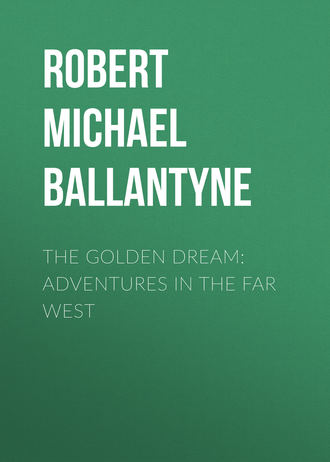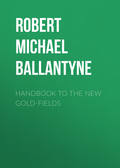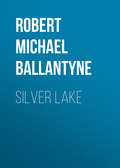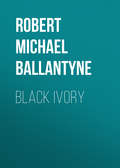
Robert Michael Ballantyne
The Golden Dream: Adventures in the Far West
In another minute the captain was at the side of the dastardly fellow, whom he seized by the neck with the left hand, while with the right he administered a hearty blow to his ribs. The man turned round fiercely, and grappled with his assailant; and then Captain Bunting became aware that his antagonist was no other than Smith, alias Black Jim, the murderer.
Smith, although a strong man, was no match for the captain, who soon overpowered him.
“Ha! you villain, have I got you?” cried he, as he almost throttled the man. “Get up now, an’ come along peaceably. If you don’t, I’ll knock your brains out with the butt of my gun.”
He permitted Black Jim to rise as he spoke, but held him fast by the collar, having previously taken from him his knife and rifle.
Black Jim did not open his lips, but the scowl on his visage shewed that feelings of deadly hatred burned in his bosom.
Meanwhile, the girl had recovered, and now approached.
“Ah! plase, sir,” she said, “let him off. Shure I don’t mind the blow; it’s done me no harm—won’t ye, now?”
“Let him off!” exclaimed the captain, violently; “no, my good girl; if he has not murdered you, he has at any rate murdered one human being that I know of, and if I can, I’ll bring him to justice.”
Kate, (for it was she), started at this reply, and looked earnestly at the man, who hung his head, and, for the first time, shewed symptoms of a softer feeling.
“Ah! it’s true, I see, an’ all hope is gone. If he’d commit a murder, he’d tell a lie too. I thought he spoke truth when he said Nelly was alive, but—”
The girl turned as she spoke, and left the spot hurriedly, while the captain took out his pocket-handkerchief, and began to fasten the arms of his prisoner behind him. But Black Jim was not to be secured without a struggle. Despair lent him energy and power. Darting forward, he endeavoured to throw his captor down, and partially succeeded; but Captain Bunting’s spirit was fully roused, and, like most powerful men whose dispositions are habitually mild and peaceful, he was in a blaze of uncontrollable passion. For some time Black Jim writhed like a serpent in the strong grasp of his antagonist, and once or twice it seemed as if he would succeed in freeing himself, but the captain’s hands had been trained for years to grasp and hold on with vice-like tenacity, and no efforts could disengage them. The two men swayed to and fro in their efforts, no sound escaping them, save an occasional gasp for breath as they put forth renewed energy in the deadly struggle. At last Black Jim began to give way. He was forced down on one knee, then he fell heavily on his side, and the captain placed his knee on his chest.
Just then a peculiar hiss was heard behind them, and the captain, looking back, observed that a third party had come upon the scene. The grizzly-bear, which has been described as watching Captain Bunting at dinner, had left its former position on the brow of the precipice, and, whether from motives of curiosity, or by accident, we will not presume to say, had followed the captain’s track. It now stood regarding the two men with an uncommonly ferocious aspect. Its indignation may, perhaps, be accounted for by the fact that they stood in the only path by which it could advance—a precipice on one side and a thicket on the other rendering the passage difficult or impossible. Grizzlies are noted for their objection to turn out of their way for man or beast, so the combatants no sooner beheld the ferocious-looking animal than they sprang up, seized their weapons, and fired together at their common enemy. Bruin shook his head, uttered a savage growl, and charged. It seemed as if Black Jim had missed altogether—not to be wondered at considering the circumstances—and the mixture of shot and slugs from the blunderbuss was little more hurtful than a shower of hail to the thick-skinned monarch of these western hills. Be this as it may, the two men were compelled to turn and flee for their lives. Black Jim, being the nimbler of the two, was soon out of sight among the rocks of the precipices, and, we may remark in passing, he did not again make his appearance. Inwardly thanking the bear for its timely appearance, he ran at top speed into the mountains, and hid himself among those wild lonely recesses that are visited but rarely by man or beast.
Captain Bunting endeavoured to save himself by darting up the face of the precipice on his left, but the foot-hold was bad, and the bear proved about as nimble as himself, compelling him to leap down again and make for the nearest tree. In doing so, he tripped over a fallen branch, and fell with stunning violence to the ground. He rose, however, instantly, and grasping the lower limb of a small oak, drew himself with some difficulty up among the branches.
The bear came thundering on, and reached the tree a few seconds later. It made several abortive efforts to ascend, and then, sitting down at the foot, it looked up, grinning and growling horribly in disappointed rage.
The captain had dropped the blunderbuss in his fall, and now, with deep regret, and not a little anxiety, found himself unarmed and a prisoner. True, his long knife was still in its place, but he was too well aware of the strength and ferocity of the grizzly-bear—from hearsay, and now from ocular demonstration—to entertain the idea of acting on the offensive with such a weapon.
The sun sank behind the mountain-peaks, and the shades of night began to fall upon the landscape, and still did Captain Bunting and the bear sit—the one at the top, and the other at the foot of the oak-tree—looking at each other. As darkness came on, the form of the bear became indistinct and shadowy; and the captain’s eyes waxed heavy, from constant staring and fatigue, so that at length bruin seemed, to the alarmed fancy of the tree’d mariner, to be twice the size of an elephant. At last the darkness became so deep that its form mingled with the shadows on the ground, and for some time the uncertainty as to its actual presence kept the prisoner wakeful; but soon his eyes began to close, despite his utmost efforts to keep them open; and for two hours he endured an agonising struggle with sleep, compared to which his previous struggle with Black Jim was mere child’s-play. He tried every possible position among the branches, in the hope of finding one in which he might indulge in sleep without the risk of falling, but no such position was to be found; the limbs of the tree were too small and too far apart.
At last, however, he did find a spot to lie down on, and, with a sigh of relief, lay back to indulge in repose. Alas! the spot was a myth—he merely dreamed it; the next moment he dropt, like a huge over-ripe pear, to the ground. Fortunately a bush broke the violence of his fall, and, springing up with a cry of consternation, he rushed towards the tree, expecting each instant to feel the terrible hug of his ursine enemy. The very marrow in his back-bone seemed to shrink, for he fancied that he actually felt the dreaded claws sinking into his flesh. In his haste he missed the branch, and fell violently forward, scratching himself terribly among the bushes. Again he rose, and a cold perspiration broke out upon him as he uttered an involuntary howl of terror, and once more leaped up at the limb of the oak, which he could just barely see. He caught it; despair nerved him, and in another moment he was safe, and panting violently among the branches.
We need scarcely say that this little episode gave his feelings such a tremendous shock that his tendency to sleep was thoroughly banished; but another and a better result flowed from it,—the involuntary hubbub created by his yells and crashing falls reached listening and not far-distant ears.
During their evening meal that day, Ned Sinton and his comrades had speculated pretty freely, and somewhat jocularly, on the probable result of the captain’s hunting expedition—expressing opinions regarding the powers of the blunderbuss, which it was a shame, Larry O’Neil said, “to spake behind its back;” but as night drew on, they conversed more seriously, and when darkness had fairly set in they became anxious.
“It’s quite clear that something’s wrong,” cried Ned Sinton, entering the tent hastily, “we must up and search for him. The captain’s not the man to lose his way with a compass in his pocket and so many landmarks round him.”
All the party rose at once, and began to buckle on belts and arm, while eagerly suggesting plans of search.
“Who can make a torch?” inquired Ned.
“Here’s one ready made to hand,” cried Maxton, seizing a huge pine-knot and lighting it.
“Some one must stay behind to look after our things. The new-comers who camped beside us to-day are not used to mining life, and don’t sufficiently know the terrors of Lynch law. Do you stop, Maxton. Now then, the rest of you, come along.”
Ned issued from the tent as he spoke, and walked at a rapid pace along the track leading up the valley, followed closely by Tom Collins, Larry O’Neil, and Bill Jones—all of whom were armed with rifles, revolvers, and bowie-knives. For a long time they walked on in silence, guided by the faint light of the stars, until they came to the flat rock which had formed the captain’s dinner-table. Here they called a halt, in order to discuss the probability of their lost comrade having gone up the ravine. The question was soon settled by Larry, who discovered a few crumbs of the biscuit lying on the rock, and footprints leading up the ravine; for the captain, worthy man, had stepped recklessly into the little stream when he went to fill his pannikin, and his wet feet left a distinct track behind him for some distance.
“He can’t have gone far up such a wild place as this,” said Tom Collins, while they moved cautiously along. “Kindle the torch, Ned, it will light us on our way, and be a guide to the captain if he’s within sight.”
“It will enlighten enemies, too, if any are within range,” replied Ned, hesitating.
“Oh, no fear,” rejoined Tom, “our greatest enemy is darkness; here, Jones, hand me your match-box.”
In a few seconds the torch flared forth, casting a broad glare of light on their path, as they advanced, examining the foot of precipices.
“Give a shout, Larry,” said Ned.
Larry obeyed, and all listened intently, but, save the echo from the wild cliffs, no reply was heard.
Had the captain been wide-awake at the time, he would, doubtless, have heard the friendly shout, but his ears were dull from prolonged watching. It was thought needless to repeat the cry, so the party resumed their search with anxious forebodings in their hearts, though their lips were silent.
They had not proceeded far, however, when the noise occasioned by the captain’s fall from the tree, as already described, struck upon their ears.
“Och! what’s that?” exclaimed Larry, with a look of mingled surprise and superstitious fear.
For a minute the party seemed transformed into statues, as each listened intently to the mysterious sounds.
“They come from the other side of the point ahead,” remarked Ned, in a whisper. “Light another torch, Larry, and come on—quick!”
Ned led the way at a run, holding one of the torches high above his head, and in a few minutes passed round the point above referred to. The glare of his torch immediately swept far ahead, and struck with gladsome beam on the now wakeful eye of the captain, who instantly greeted it with one of his own peculiarly powerful and eminently nautical roars.
“Hooroo!” yelled Larry, in reply, dashing forward at full speed. “Here we are all right, capting, comin’ to the rescue; don’t give in, capting; pitch into the blackguards—”
“Look out for the grizzly-bear,” roared the captain, as his friends advanced at a run, waving their torches encouragingly.
The whole party came to a dead halt on this unexpected caution, and each cocked his piece as they looked, first into the gloom beyond, and then at each other, in surprise and perplexity.
“Halloo! captain, where are you?” shouted Ned.
“And where’s the bear!” added Tom Collins.
“Right in front o’ you,” replied the captain, “about fifty yards on. The bear’s at the bottom o’ the tree, and I’m a-top of it. Come on, and fire together; but aim low, d’ye hear?”
“Ay, ay, sir,” replied Bill Jones, as if he were answering a command on shipboard, while he advanced boldly in the direction indicated.
The others were abreast of him instantly, Ned and Larry holding the torches high in their left hands as they approached, step by step, with rifles ready for instant use.
“Have a care,” cried the captain; “I see him. He seems to be crouchin’ to make a rush.”
This caused another halt; but as no rush was made, the party continued to advance very slowly.
“Oh! av ye would only shew yerself,” said Larry, in a suppressed tone of exasperation at being kept so long in nervous expectation.
“I see him,” cried Ned, taking aim.
The rest of the party cried “Where!” aimed in the same direction, and the whole fired a volley, the result of which was, that Captain Bunting fell a second time to the ground, crashing through the branches with a terrible noise, and alighting heavily at the foot of the tree. To the surprise of all, he instantly jumped up, and seizing Ned and Tom as they came up, shook them warmly by the hand.
“Och! are ye not shot, capting?” exclaimed Larry.
“Not a bit; not even hurt,” answered the captain, laughing.
The fact was, that Captain Bunting, in his anxiety to escape being accidentally shot by his comrades, had climbed to the utmost possible height among the tender top branches of the oak. When the volley was fired, he lost his balance, fell through the tree, the under branches of which happily broke his fall, and finally alighted on the back of the grizzly-bear itself, which lay extended, and quite dead, on the ground.
“Faix we’ve polished him off for wance,” cried Larry, in the excess of his triumph, as he stood looking at the fallen bear.
“Faix we’ve done nothing of the sort,” retorted Tom Collins, who was examining the carcase. “It’s been dead for hours, and is quite cold. Every bullet has missed, too, for the shot that settled him is on the side next the ground. So much for hasty shooting. Had bruin been alive when we fired, I’m inclined to think that some of us would not be alive now.”
“Now, that’s wot I wos sure of,” remarked Bill Jones. “Wot I says is this—w’en yer goin’ aloft to reef to’sails, don’t be in a hurry. It’s o’ no manner o’ use tryin’ to shove on the wind. If ye’ve got a thing to do, do it slow—slow an’ sure. If ye haven’t got a thing to do, in coorse ye can’t do it, but if ye have, don’t be in a hurry—I says.”
Bill Jones’s maxim is undoubtedly a good one. Not a scratch had the bear received from any one of the party. The bullet of Black Jim had laid him low. Although hurriedly aimed, it had reached the animal’s heart, and all the time that Captain Bunting was struggling to overcome his irresistible tendency to sleep, poor bruin was lying a helpless and lifeless body at the foot of the oak-tree.
Chapter Fifteen.
Ah-wow saved from an Untimely Fate—Lynch Law Enforced—Ned Sinton resolves to renounce Gold-Digging for a Time, and Tom Collins seconds him
Ah-wow sat on the stump of an oak-tree, looking, to use a familiar, though incorrect expression, very blue indeed. And no wonder, for Ah-wow was going to be hanged. Perhaps, courteous reader, you think we are joking, but we assure you we are not. Ah-wow had just been found guilty, or pronounced guilty—which, at the diggings, meant the same thing—of stealing two thousand dollars’ worth of gold-dust, and was about to expiate his crime on the branch of a tree.
There could be no doubt of his guilt; so said the enlightened jury who tried him; so said the half-tipsy judge who condemned him; and so said the amiable populace which had assembled to witness his execution. It cannot be denied that appearances went very much against Ah-wow—so much so, that Maxton, and even Captain Bunting, entertained suspicions as to his innocence, though they pleaded hard for his pardon. The gold had been discovered hid near the Chinaman’s tent, and the bag containing it was recognised and sworn to by at least a dozen of the diggers as that belonging to the man from whom the gold had been stolen. The only point that puzzled the jury was the strong assertions of Captain Bunting, Maxton, and Collins, that, to their certain belief, the poor Celestial had dug beside them each day, and slept beside them each night for three weeks past, at a distance of three miles from the spot where the robbery took place. But the jury were determined to hang somebody, so they shut their ears to all and sundry, save and except to those who cried out, “String the riptile up—sarves him right!”
Ko-sing also sat on the tree-stump, endeavouring to comfort Ah-wow by stroking his pig-tail and howling occasionally in an undertone. It seemed indeed that the poor man’s career was drawing to a close, for two men advanced, and, seizing his pinioned arms, led him under the fatal limb; but a short respite occurred in consequence of a commotion in the outskirts of the crowd, where two men were seen forcing a passage towards the centre. Ned Sinton and Larry O’Neil had been away in the mountains prospecting at the time when Ah-wow was captured and led to the settlement, near the first residence of our adventurers, to stand his trial. The others accompanied the condemned man, in order, if possible, to save him, leaving Jones behind to guard their property, and acquaint Ned with the state of affairs on his return. Our hero knew too well the rapid course of Lynch law to hesitate. He started at once with Larry down the stream, to save, if possible, the life of his servant, for whom he felt a curious sort of patronising affection, and who he was sure must be innocent. He arrived just in time.
“Howld on, boys,” cried Larry, flourishing his felt hat as they pushed through the crowd.
“Stay, friends,” cried Ned, gaining the centre of the circle at last; “don’t act hastily. This man is my servant.”
“That don’t make him an honest man, I guess,” said a cynical bystander.
“Perhaps not,” retorted Ned; “but it binds me in honour to clear him, if I can.”
“Hear, hear,” said several voices; “get up on the stump an’ fire away, stranger.”
Ned obeyed.
“Gentlemen,” he began, “I can swear, in the first place, that the Chinaman has not been a quarter of a mile from my tent for three weeks past, so that he could not have stolen the gold—”
“How then came it beside his tent?” inquired a voice.
“I’ll tell you, if you will listen. This morning early I started on a prospecting ramble up the stream, and not long after I set out I caught a glance of that villain Black Jim, who, you know, has been supposed for some time back to have been lurking in the neighbourhood. He ran off the moment he caught sight of me, and although I followed him at full speed for a considerable distance, he succeeded in escaping. However, I noticed the print of his footsteps in a muddy place over which he passed, and observed that his right boot had no heel. On returning home this afternoon, and hearing what had happened, I went to the spot where the bag of gold had been discovered, and there, sure enough, I found footprints, one of which shewed that the wearer’s right boot had no heel. Now, gentlemen, it don’t need much speaking to make so clear a matter clearer, I leave you to judge whether this robbery has been committed by the Chinaman or not.”
Ned’s speech was received with various cries; some of which shewed that the diggers were not satisfied with his explanation, and Ah-wow’s fate still trembled in the balance, when the owner of the bag of gold stepped forward and admitted that he had observed similar foot-marks in the neighbourhood of his tent just after the robbery was committed, and said that he believed the Chinaman was innocent. This set the matter at rest. Ah-wow was cast loose and congratulated by several of the bystanders on his escape, but there seemed a pretty general feeling amongst many of the others that they had been unjustly deprived of their prey, and there is no saying what might have happened had not another culprit appeared on the scene to divert their attention.
The man who was led forward had all the marks of a thorough desperado about him. From his language it was impossible to judge what country had the honour of giving him birth, but it was suspected that his last residence had been Botany Bay. Had this man’s innocence been ever so clearly proved he could not have escaped from such judges in their then disappointed state of mind; but his guilt was unquestionable. He had been caught in the act of stealing from a monté table. The sum was not very large, however, so it was thought a little too severe to hang him; but he was condemned to have his head shaved, his ears cut off, and to receive a hundred lashes.
The sentence was executed promptly, notwithstanding the earnest remonstrances of a few of the better-disposed among the crowd: and Ned, seeing that he could do nothing to mitigate the punishment of the poor wretch, left the spot with his comrades and the rescued Chinaman.
That night, as they all sat round their camp-fire, eating supper with a degree of zest known only to those who labour at severe and out-of-door occupation all day, Ned Sinton astonished his companions not a little, by stating his intention to leave them for the purpose of making a tour through the country.
“Make a tour!” exclaimed Maxton, in surprise.
“An’ lave all the goold!” cried Larry O’Neil, pausing in his mastication of a tough lump of bear-steak.
“Why, boy,” said Captain Bunting, laying down his knife, and looking at Ned in amazement, “what’s put that in your head, eh?”
“Being somewhat tired of grubbing in the mud has put it into my head,” replied Ned, smiling. “The fact is, comrades, that I feel disposed for a ramble, and I don’t feel bent on making a fortune. You may, perhaps, be surprised to hear such a statement, but—”
“Not at all—by no means,” interrupted Bill Jones; “I’m surprised at nothin’ in this here country. If I seed a first-rate man-o’-war comin’ up the valley at fifteen knots, with stun’-sails alow and aloft, stem on, against the wind, an’ carryin’ all before it, like nothin’, I wouldn’t be surprised, not a bit, so I wouldn’t!”
“Well, perhaps not,” resumed Ned; “but, surprised or not, my statement is true. I don’t care about making my ‘pile’ in a hurry. Life was not given to us to spend it in making or digging gold; and, being quite satisfied, in the meantime, with the five or six hundred pounds of profits that fall to my share, I am resolved to make over my unfinished claim to the firm, and set out on my travels through the country. I shall buckle on my bowie-knife and revolver, and go where fancy leads me, as long as my funds last; when they are exhausted, I will return, and set to work again. Now, who will go with me?”
“Are you in earnest?” asked Tom Collins.
“In earnest! ay, that am I; never was more so in my life. Why, I feel quite ashamed of myself. Here have I been living for weeks in one of the most romantic and beautiful parts of this world, without taking more notice of it, almost, than if it did not exist. Do you think that with youth and health, and a desire to see everything that is beautiful in creation, I’m going to stand all day and every day up to the knees in dirty water, scraping up little particles of gold? Not I! I mean to travel as long as I have a dollar in my pocket; when that is empty, I’ll work.”
Ned spoke in a half-jesting tone, but there is no doubt that he gave utterance to the real feelings of his heart. He felt none of that eager thirst for gold which burned, like a fever, in the souls of hundreds and thousands of the men who poured at that time in a continuous and ever-increasing stream into California. Gold he valued merely as a means of accomplishing present ends; he had no idea of laying it up for the future; married men, he thought, might, perhaps, with propriety, amass money for the benefit of their families, but he wasn’t a married man, and didn’t mean to be one, so he felt in duty bound to spend all the gold he dug out of the earth.
We do not pretend to enter into a disquisition as to the correctness or incorrectness of Ned’s opinions; we merely state them, leaving our reader to exercise his own reasoning powers on the subject, if so disposed.
For a few seconds after Ned’s last speech, no sound escaped the lips of his comrades, save those resulting from the process of mastication. At last, Tom Collins threw down his knife, and slapped his thigh energetically, as he exclaimed, “I’ll go with you, Ned! I’ve made up my mind. I’m tired of digging, too; and I’m game for a ramble into the heart of the Rocky Mountains, if you like.”
“Bravo! Tom,” cried Captain Bunting, slapping his companion on the shoulder—“well and bravely spoken; but you’re a goose for all that, and so, saving his presence, is Commodore Ned Sinton. Why, you’ll just waste two months or so in profitless wandering, and return beggars to the Little Creek to begin the work all over again. Take my advice, lads—the advice of an old salt, who knows a thing or two—and remain where you are till we have worked out all the gold hereabouts. After that you may talk of shifting.”
“You’re a very sour old salt to endeavour to damp our spirits in that way at the outset, but it won’t do; my mind is made up, and I’m glad to find that there is at least one of the party who is strong enough to break these golden chains.”
“Faix I comed here for goold, an’ I stop here for the same raison,” remarked Larry, scraping the last morsels from the bottom of the kettle with an iron spoon; “I’ve thravelled more nor enough in me day, so I can affoord to stop at home now.”
“Get out, you renegade! do you call this home?” cried Ned.
“’Tis all that’s of it at present, anyhow.”
“When shall we start?” inquired Tom Collins.
“To-morrow. We have few preparations to make, and the sooner we go the better; for when the rainy season sets in, our journeying will be stopped perforce. I have a plan in my mind which I shall detail to you after we retire to rest. Meanwhile I’ll go and improve my bed, which has been so uncomfortable for some nights past that my very bones are aching.”
Ned rose, took up an axe, and, going into the bush in rear of the tent, cut down a young pine-tree, the tender shoots and branches of which he stripped off and strewed thickly on the ground on which he was wont to sleep; over these he spread two thick blankets, and on this simple but springy and comfortable couch he and Tom Coffins lay down side by side to talk over their future plans, while their comrades snored around them.
Daylight found them still talking; so, pausing by mutual consent, they snatched an hour’s repose before commencing the needful preparations for their contemplated journey.







